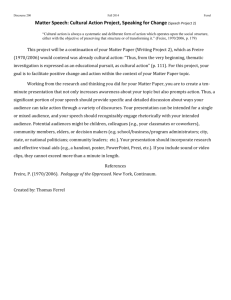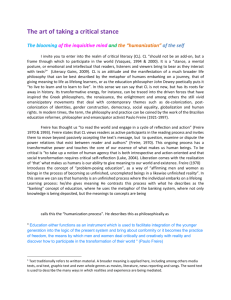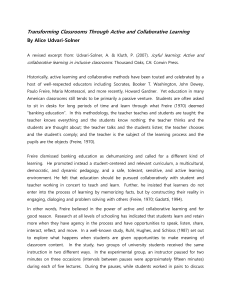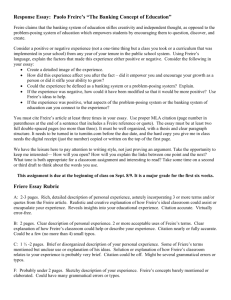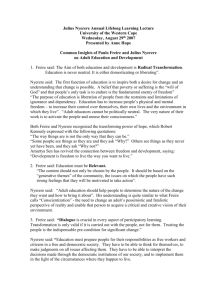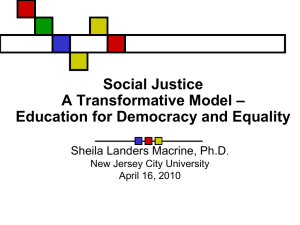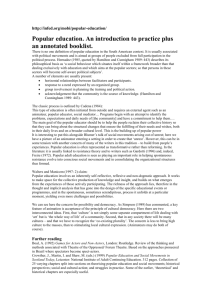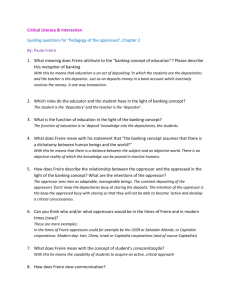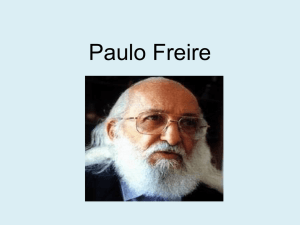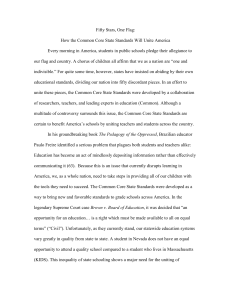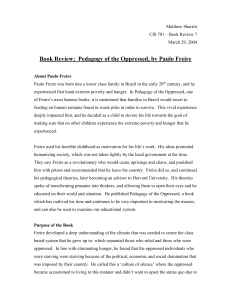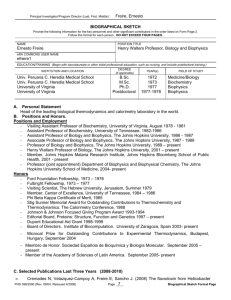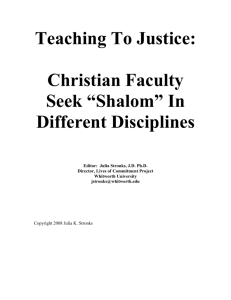The work of Paulo Freire is as important in
advertisement
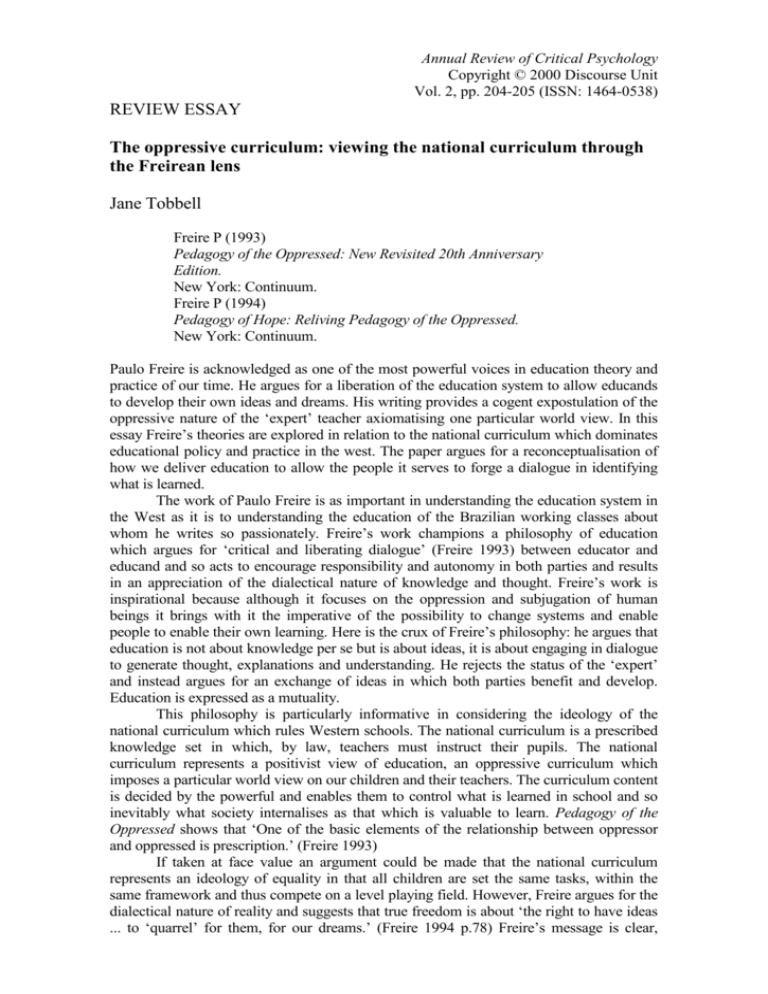
Annual Review of Critical Psychology Copyright © 2000 Discourse Unit Vol. 2, pp. 204-205 (ISSN: 1464-0538) REVIEW ESSAY The oppressive curriculum: viewing the national curriculum through the Freirean lens Jane Tobbell Freire P (1993) Pedagogy of the Oppressed: New Revisited 20th Anniversary Edition. New York: Continuum. Freire P (1994) Pedagogy of Hope: Reliving Pedagogy of the Oppressed. New York: Continuum. Paulo Freire is acknowledged as one of the most powerful voices in education theory and practice of our time. He argues for a liberation of the education system to allow educands to develop their own ideas and dreams. His writing provides a cogent expostulation of the oppressive nature of the ‘expert’ teacher axiomatising one particular world view. In this essay Freire’s theories are explored in relation to the national curriculum which dominates educational policy and practice in the west. The paper argues for a reconceptualisation of how we deliver education to allow the people it serves to forge a dialogue in identifying what is learned. The work of Paulo Freire is as important in understanding the education system in the West as it is to understanding the education of the Brazilian working classes about whom he writes so passionately. Freire’s work champions a philosophy of education which argues for ‘critical and liberating dialogue’ (Freire 1993) between educator and educand and so acts to encourage responsibility and autonomy in both parties and results in an appreciation of the dialectical nature of knowledge and thought. Freire’s work is inspirational because although it focuses on the oppression and subjugation of human beings it brings with it the imperative of the possibility to change systems and enable people to enable their own learning. Here is the crux of Freire’s philosophy: he argues that education is not about knowledge per se but is about ideas, it is about engaging in dialogue to generate thought, explanations and understanding. He rejects the status of the ‘expert’ and instead argues for an exchange of ideas in which both parties benefit and develop. Education is expressed as a mutuality. This philosophy is particularly informative in considering the ideology of the national curriculum which rules Western schools. The national curriculum is a prescribed knowledge set in which, by law, teachers must instruct their pupils. The national curriculum represents a positivist view of education, an oppressive curriculum which imposes a particular world view on our children and their teachers. The curriculum content is decided by the powerful and enables them to control what is learned in school and so inevitably what society internalises as that which is valuable to learn. Pedagogy of the Oppressed shows that ‘One of the basic elements of the relationship between oppressor and oppressed is prescription.’ (Freire 1993) If taken at face value an argument could be made that the national curriculum represents an ideology of equality in that all children are set the same tasks, within the same framework and thus compete on a level playing field. However, Freire argues for the dialectical nature of reality and suggests that true freedom is about ‘the right to have ideas ... to ‘quarrel’ for them, for our dreams.’ (Freire 1994 p.78) Freire’s message is clear, Jane Tobbell teaching is not about knowledge transmission it is about teaching children to learn about learning. Importantly Freire discusses the concept of readiness to learn. An essential message of Freire’s is that learning is impossible without taking into account the position of the learner. This means that teaching and learning are not objective activities, instead they can only be achieved when the subjectivity of the learner and the teacher have been taken into account. In ignoring the subjective position of the learner and in failing to acknowledge her/his own position, the teacher is acting as an oppressive agent in that s/he is imposing her/his consciousness on the learner. Indeed this message is clear when considering other learning theorists. Piaget, whilst one might want to argue with his genetic epistemology, is clear that learning is about being ready and in the absence of this readiness learning cannot occur. Vygotsky’s zone of proximal development proposes that learning takes place in the interaction between the learner and the teacher which suggests that a mutual readiness is a prerequisite for learning. In this idea Freire’s argument that education should be about dialogue is revisited. The idea rejects the notion of the passive learner waiting for the teacher’s instruction. Learning is about an interaction between both parties and is influenced by the knowledge, ideas and assumptions both parties bring to the situation. This idea is central to Freire’s pedagogical ideas and is a useful concept in examining the western educational insistence on the national curriculum. A well known claim in France is that officials of Le Ministre de l’Education can proudly boast that they can predict what is being taught in any classroom in any French school at any time. In Freire’s terms this should not constitute a boast but instead a shameful admission. Schools should reflect the students and teachers who inhabit them instead of the oppressive regime of a ‘ruling class’. Using Freire’s work to understand this is instructive. He talks powerfully about what oppression means in the subjectivities it engenders in its victims. This understanding can usefully be applied to both teachers and children in the classroom. The national curriculum deskills teachers and constrains children. The imposition of a national curriculum translates to educational control being in the hands of central government. Governments tend to comprise white, middle class males which may be why most national curricula are sparse in their references to cultures alternative to that societal group. The books studied, the subjects deemed important represent one particular view of the world. Any child coming to school who does not share this view would and could not be ‘ready’ to learn. So, whilst the prevailing discourse to explain school failure centres on the dichotomy of inadequate teachers or ‘stupid’ children, Freire’s work helps us to understand that neither of these are compelling explanations. It doesn’t matter how inspirational the teacher is or how ‘clever’ the child is, unless both are prepared, learning cannot occur. Thus, education is about enabling children and teachers to enter into a dialogue about the curriculum, about ensuring that they are part of the knowledge and not subject to it. In doing this the reality of the child is acknowledged as her/his individual starting point and the white male hegemonic knowledge set is recognised as but one representation. In this view of teaching and learning we see the revolutionary nature of Freire. For in order to introduce these ideas into the practice of education a revolution in how education is conceptualized is required. In politicising education for the students a de-party politicalisation of the system is necessary so that education no longer reflects the prevailing ideology of the politicians in power but instead serves the children it seeks to educate by freeing them to question the multiplicity of discourses and allowing them to locate particular subject knowledge within the framework of whole world knowledge. The last words are best left to Freire from Pedagogy of Hope in which he sums up the dangers of letting the ‘expert’ decide: ‘... the moment the educator’s ‘directivity’ interferes with the creative, formulative, investigative capacity of the educand, the 205 Jane Tobbell necessary directivity is transformed into manipulation, into authoritarianism.’ (Freire, 1994, p.79) Jane Tobbell is a Senior Lecturer in Psychology at Manchester Metropolitan University. Address: Department of Psychology and Speech Pathology, Manchester Metropolitan University, Elizabeth Gaskell Campus, Hathersage Road, Manchester, M13 OJA, UK. Email: j.tobbell@mmu.ac.uk 206
